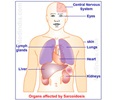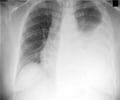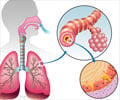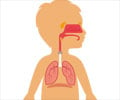Bronchitis
Bronchitis is an inflammation of the bronchi, the large airways inside the lungs. (Bronchiolitis is the inflammation of the bronchioles, the small airways.) The inflammation causes these passages, or bronchial tubes, to increase their production of mucus that is thick and yellow or grey in color, which is then coughed up. Bronchitis may be either acute or chronic.
Symptoms of acute bronchitis include fever, chest pain, and a cough that brings up mucus. Acute bronchitis can be caused by a respiratory infection, such as a cold. It also can result from breathing irritating fumes, such as those of tobacco smoke or polluted air.
Doctors consider the condition chronic if such coughing lasts for several months in each of two or more successive years. Chronic bronchitis may produce shortness of breath and, in severe cases, heart failure. The most common cause of chronic bronchitis is cigarette smoking. Either type of bronchitis may lead to asthma or pneumonia.
Bronchitis may be treated with drugs that expand the bronchial tubes, or with compounds that loosen mucus so it can be coughed up more easily. Moist air also helps loosen mucus. Antibiotics are prescribed if a bacterial infection is present. Most cases of acute bronchitis clear up within weeks. Chronic bronchitis cannot be cured.
The doctor may recommend cough medicines, antibiotics and plenty of bed rest. Chronic bronchitis usually persists for long periods of time and occurs most often in heavy smokers or as the result of recurring episodes of acute bronchitis. If you have bronchitis and smoke, you should stop. Smoking puts you at risk of emphysema, a life-threatening disease that deteriorates the lungs.
An antibiotic or inhaler is often prescribed. Cough medicines should not be used with chronic bronchitis because coughing is the only way the lungs can get rid of the mucus.


























